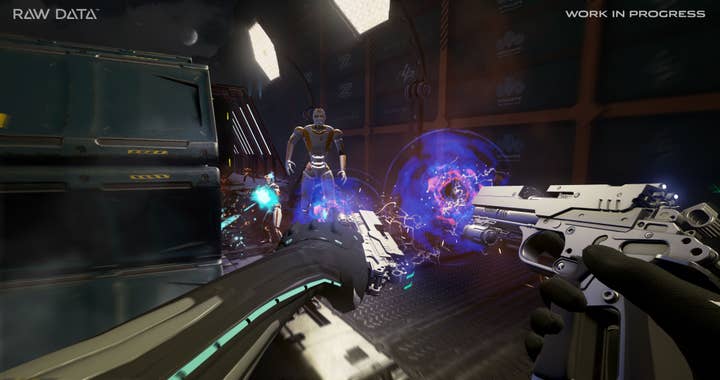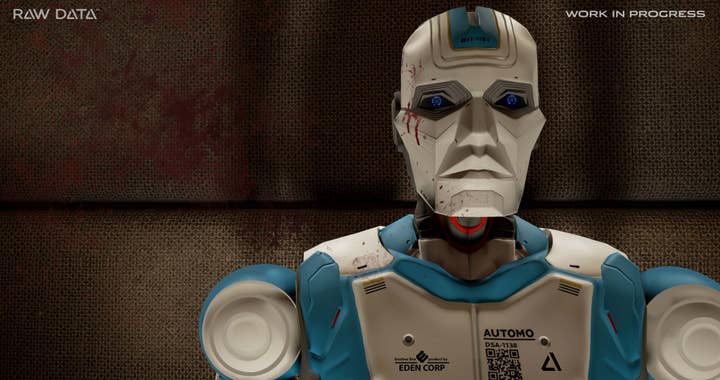VR won't be to games what 3D was to movies - Survios
“We don't need as broad an adoption of VR for it to sustain a AAA ecosystem,” says Raw Data dev Chris Hewish
VR startup Survios proudly announced last month that its futuristic co-op shooter Raw Data became the first VR title to generate revenues of $1 million in the span of a month. Steam Spy data showed that more than 33,000 people had purchased the $40 game, which is still in Early Access. That $1 million in revenues, however, brings up the million-dollar question: When $1 million represents the peak of success, how can VR developers actually make a living in this VR ecosystem?
"It's a very valid question. The short answer is that it's not enough to sustain a studio over a long period," Chris Hewish, head of studio at Survios tells me bluntly.
Survios is in the enviable position of having raised $4 million from Shasta Ventures a couple years ago, when the studio was working on Project Holodeck. Without that money, working towards AAA on VR platforms like HTC Vive would be infinitely harder. That said, with claims of an attach rate of more than 20% for Raw Data, Survios believes it's in a prime position to thrive in a AAA VR market as the installed base grows.
"The attach rate that we've had to the installed base, if we look 12 months down the road, 18 months down the road, where we believe the installed base will be, if the attach rate is even a fraction of what we currently have then we have a very sustainable business," Hewish says.
"Price and reviews puts everything on the consumers' shoulders but if there was some sort of designation, some way for the stores to designate that this is a full game or an experience, it would help the industry avoid consumer frustration"
"For us, we're really taking a bit of a longer view when it comes to the business. We're very fortunate that we have great backers, that we're funded well enough to take a longer view. Our goal, if you're looking at the existing console business or PC business or mobile business, those are all mature businesses where the objective for any developer or studio is revenue because you can have a fairly predictable outcome. If you put X amount of funding in and you can have a certain quality bar, you're going to recoup your costs. It becomes much more important about being on time, on budget - it's much more of a mature business model. With VR my point of view is it's a new market and we are not at a point yet where it can sustain AAA development but we will get there."
With that in mind, Hewish believes that it's critical for Survios to "stake its claim" as a AAA VR studio now. He says that a lot of studios have struggled with having to make what are essentially demos, or more casual experiential titles instead of full-game efforts, because of the economics of VR. "There definitely is a tug and pull between those two ends of the spectrum and initially a lot of the discussion and a lot of the awareness was around experiential and short demo experiences. So for me the question was could the market go in that [AAA] direction? [If not] personally I believe the market would peter out," he continues. "While there are a lot of cool experiences, I don't think that's enough to sustain a market or an industry. Being able to see that, while the market's super nascent, we're beginning to see AAA games come out and people do want them [is encouraging]."
Survios is eager to see the VR market evolve and hopes it's part of the developer community that pushes it in exciting and new directions. The studio has a core tenet that it calls "Active VR," and I can tell while talking to Hewish that he's quite passionate about it.

"That is certainly central to our thesis. We really want the user to have a very active experience. It's a key differentiator between this platform and others and it also touches on another thing, which is a soapbox item for me... VR and Active VR, this is an opportunity for the user to really feel heroic and to do things that you could never do in real life. It just kills me that there are games out there just recreating what you can do in real life; to me that's just a missed opportunity," he comments.
"I'm not bagging on anybody, I don't have a specific developer in mind, and this is just an example since I don't know if anyone's done this, but why would I want to play chess in VR? I can do that in real life. I want to be heroic, with bad ass abilities and go into environments I could never see in real life and be extremely active in those environments. To me that's the holy grail of VR, that's what it offers. Getting that into consumers' hands is the win for the medium."
Hewish definitely sees eye-to-eye with Oculus CTO John Carmack on that front. The former id executive recently commented during Oculus Connect that too many VR developers are simply "coasting on novelty," putting games into VR that don't necessarily bring any additional value to players for being in VR.
"What he said definitely resonates a lot with me. At the same time, I agree from a business perspective. I saw this when I was working at Dreamworks Animation, when we were working on 3D movies. We were making movies specifically made for 3D so the entire pipeline and production process was different than a traditional 2D animated film, yet a lot of studios across the industry would turn films into 3D in post-production, which really soured the audience because there was a premium price to go view those films. If it wasn't really made from the get-go for 3D it was a little underwhelming. So from a market and business standpoint that really scares me because we all saw how that played out for film and there's the potential in VR for that same problem where the consumer gets a little bit burned and walks away from the medium," Hewish warns.
"With VR if you can confidently sell even a few hundred thousand units of a premium price point game, you're going to be able to recoup your money because we're not talking about productions on the scale of a movie or even a AAA console game like Call of Duty"
That being said, Hewish is fully aware of how tough it can be on VR developers at the moment. He doesn't believe studios are taking shortcuts out of greed, but he would like to see better curation and discoverability on storefronts so that consumer fully understand what they're downloading, whether a short demo-like experience or a full AAA game.
"I'm not ignorant of the reality that a lot of the developers are in. A lot of people are bootstrapping themselves; it's a passion play to work with the technology and they just aren't resourced to build larger games. It's that tinkerer sort of approach - it's not that these people hate VR and are trying to destroy the medium, but they are doing what they can with what they have. What I would love to see, which would be on the platform and store holder side, something that would allow the consumer to identify the difference not just solely based on price and reviews. Price and reviews puts everything on the consumers' shoulders but if there was some sort of designation, some way for the stores to designate that this is a full game or an experience, it would help the industry avoid consumer frustration," he notes.
Steam has already announced that it's looking to improve its platform with more targeted surfacing of new releases. That's a good first step, at least. "It's just scary - having gone through the mobile days, the moniker the App Store got was the Crap Store and how do we avoid that [with VR]?" Hewish wonders.
Getting back to that million-dollar question, though, what Survios and other VR startups should be encouraged by is that it actually is possible to build compelling VR games without breaking the bank, compared to say the budgets needed for a Call of Duty or GTA.
"One thing that gives me real confidence in VR, which is different from what happened with 3D movies and even more so 3D television... neither one of those mediums had really good content to drive adoption. The content was expensive to create and the size of the market to recoup against that content creation was much, much larger than what we're looking at with VR. With VR if you can confidently sell even a few hundred thousand units of a premium price point game, you're going to be able to recoup your money because we're not talking about productions on the scale of a movie or even a AAA console game like Call of Duty where they're north of $100 million in development costs let alone marketing," Hewish says.
"The fact that for AAA VR you can develop at a much lower cost, while still very high, the size of the market doesn't need [to be huge]... We don't need as broad of an adoption in VR for it to sustain a AAA ecosystem."

That's all well and good, but what advice does Hewish have for the VR startups that can't get much if any funding currently? "First and foremost, just be very clear and upfront with the audience when you do release something. There's nothing wrong [with AA content]... And of course you don't want the industry to be in a situation where innovation is killed because people feel like if they don't launch AAA they shouldn't launch anything," he says.
"Just being clear with the audience, setting expectations - so much of conflict and frustration in life is about mismatched expectations, so setting the expectation with the audience that 'hey we're a small developer, we're bootstrapping here, we have a great idea, great experience we want to share with you and if you like it we're going to continue to evolve it and grow it' - I think just being clear with the audience and pricing accordingly, there's nothing wrong with putting out smaller experiences at a lower price point."
Hewish adds that one approach is to actually build your way up towards a full AAA release: "Say in your mind you have a AAA game you want to make and it's got five core key features but you can't fund it all at once, so maybe one approach is you release one mechanic at a time as an experience at a lower price point and along the way you're getting enough income to sustain yourself and you're building your core engine essentially. So you release five experiences, each one is a low price point, enough to keep you going and allow you to build the next experience and then when you're done with all of those you've got your mechanics to build a bigger game. It's sort of amortizing your costs across different SKUs. Then lastly, if you've got a really great idea and a great demo, there's no harm in going to someone who might be able to help fund it further and help turn it into a AAA game. We're going to start seeing the evolution and we already are seeing studios out there that are funding content and publishing."
Indeed, Survios could become one of those publishers in addition to evolving into a multi-project VR studio. "Something that we're looking at ourselves is looking at doing third-party publishing across all platforms," Hewish tells me. "We definitely are working on additional games," he adds. "The way that we're built we have our core game studio and then we have our prototype team that's part of the studio that works on rapid prototypes and iterations of different ideas and mechanics and we have a couple that have really hit and we are ramping up to get into full production on some of those to launch some additional games next year. We absolutely are looking at a portfolio approach to the business."
Publishing deals and funding exclusives has been one way that Oculus has helped to grow the VR market, enabling some developers to build out more robust games than would have been possible otherwise. Oculus boasted during Oculus Connect that it's invested $250 million into the ecosystem already and will invest another $250 million on top of that. And while there are many positives around this infusion of capital, Hewish cautions that developers have to think carefully about their studio approach.
"I think it's one leg of the stool, and it's important. It certainly doesn't come without its risks, but I think it can be important in sustaining studios through the initial growth curve of the market. The risk is that as a studio if you're given a big wad of cash to develop exclusively for one platform and you spend all of that on developing that game, then you don't have an ongoing revenue stream to get you into the next game, and once the market matures those funds for exclusive content may be harder to get or may shift to go to developers that are proven in AAA, so it's just a risk," he advises.
"I would say any studio that does that should be planning, how do they survive after that? Where are they going to get funding next? Or have they put enough aside out of that investment to sustain into the next game when they aren't getting funded for exclusives? Conversely, they could look to studios that are not doing platform exclusives," he continues, hinting at Survios' potential future in publishing. "With an Oculus or someone it might be more a straight work for hire model, fully funding an exclusive title, whereas for us it would be more a publisher model we're looking at so there would be an ongoing revenue stream for the developer to help them grow."
"The one thing we know looking back at history, within a couple years the hit genres and the hit content on VR may not be what we think it is currently or there'll be something new that evolves"
Aside from the economics of development, one critical component that Survios has learned about from being in Early Access is optimization. "Being a startup, we are still trying to play catchup when it comes to having a robust compatibility lab and being able to test across multiple configurations. I hearken back to the day of making games for PCs and you really had to worry about the different configurations and drivers people had running on their machines and that's really important in VR. We kind of developed on the hardware we had at the time so we're playing catchup in that regard in terms of getting the performance and the optimization equal across all configurations. I would say going forward for any VR developer, really budgeting extra time for that and communicating to your audience that you're working on it and engage them to give you feedback so you can optimize properly is pretty important. So we're now budgeting extra time for optimization and performance into each of our spreads even if it means pushing content out a bit further," Hewish notes.
Speaking of optimization, while Survios built Raw Data for Vive, the studio is platform agnostic and is working on bringing the game to other VR platforms, but they will have to be optimized against the strengths and weaknesses of each.
"I've been in the industry long enough where I've seen people just develop for a lead platform and port it across everything and it's just a crap experience because they just simply get it to run and that kind of approach is not a AAA approach and could kill the market before it even gets going," Hewish warns.
With that in mind, Raw Data will need special attention for something like PSVR, which doesn't have the precise tracking of Vive. "We'll take as long as we need to take to make sure that the experience is great on that platform," Hewish stresses. "So what you're saying about the Move and PS4, maybe we'll do things like adjust the intensity of how quickly the enemies spawn or where they spawn from, or maybe we work on some of the haptics and some of the controls, or maybe we rewrite a little bit of stuff so the motion doesn't need to be as precise... I'm just throwing stuff out there, not saying we're actively doing these things. On the Vive we're trying to get closer to 1:1 movement but maybe on Sony we go for a pattern movement that triggers an animation or something - so to the PSVR player it feels great."
In the end, Hewish is just excited to be part of the VR revolution. "The one thing we know looking back at history, within a couple years the hit genres and the hit content on VR may not be what we think it is currently or there'll be something new that evolves," he says. "Like on mobile, it really brought back strategy games and iterated on those, and puzzle games, which had been around but they evolved to match the medium. VR has that same potential."

